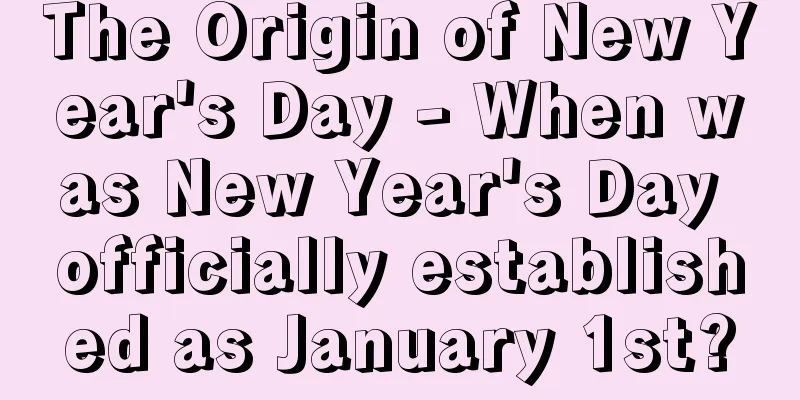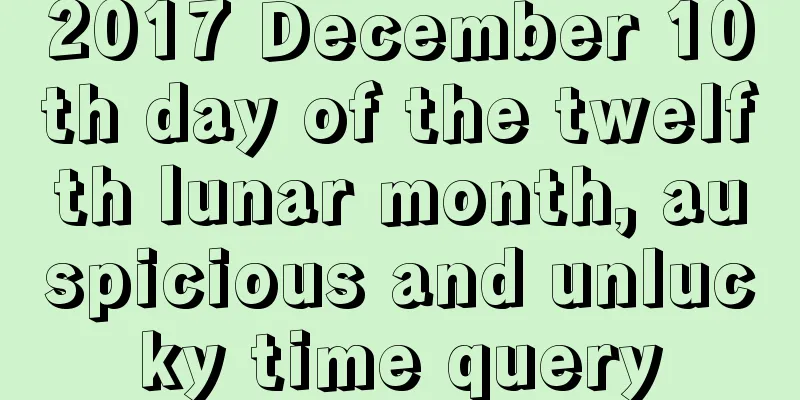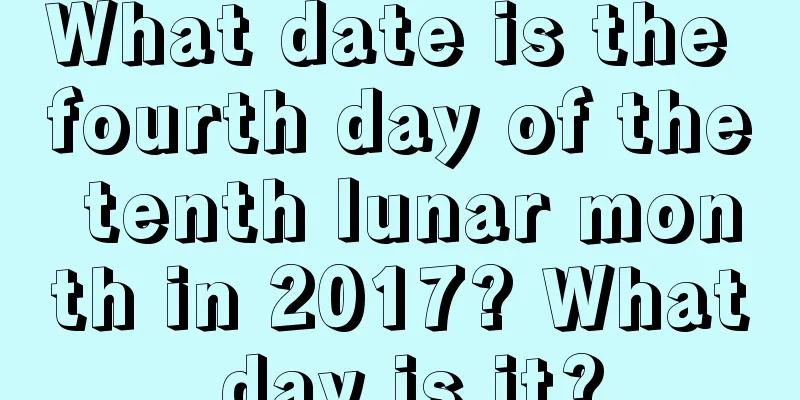The Origin of New Year's Day - When was New Year's Day officially established as January 1st?

We all know that New Year's Day is on January 1st of the lunar calendar every year. So when was this date determined? The origin of New Year's Day - when was New Year's Day officially established as January 1st? The twelfth month of the lunar calendar is commonly known as "La Yue" among the people. If you want to know more about the twelfth month of the lunar calendar in 2019, please visit Mr. Shui Mo’s website!The Origin of New Year's Day - When was New Year's Day officially established as January 1st?——On September 27, 1949, the First Chinese People's Political Consultative Conference: formally established January 1 as the Chinese New Year's Day . While deciding to establish the People's Republic of China, it also decided to adopt the world's universal Gregorian calendar, which we call the Gregorian calendar. New Year's Day refers to the first day of the year in the Western calendar."2" In order to distinguish the two New Years of the lunar calendar and the Gregorian calendar, and in view of the fact that the "Start of Spring" in the 24 solar terms falls around the first day of the first lunar month, the first day of the first lunar month was renamed "Spring Festival", and January 1 of the Gregorian calendar was designated as the beginning of the new year - "New Year's Day", and was included in the legal holidays, becoming a holiday for the people of the whole country. 《3》January 1st of each year marks the arrival of the new year. People are accustomed to calling this day "New Year's Day", commonly known as "Gregorian Year", "Solar Year" or "New Calendar Year". ——Traditional New Year’s Day customs: setting off firecrackers, killing three living creatures, worshiping ghosts and gods, and paying homage to ancestors, etc. 》Setting off firecrackers - Good luck and prosperity <br /> Setting off firecrackers is a traditional Chinese custom with a history of more than 2,000 years. It is said that it was used to drive away a monster called Nian. When the clock strikes midnight, the New Year's bell rings and the sound of firecrackers shakes the sky over the entire Chinese land. At the "Three Yuan" moment of "the beginning of the year, the beginning of the month, and the beginning of the hour", some places still build "strong fires" in the courtyard to show that the strong energy reaches the sky, and the prosperity is flourishing, and good luck is coming. 》Ancestor worship - worshipping ancestors <br /> Ancestor worship is a grand folk activity. New Year's Eve, Qingming Festival, Double Ninth Festival and Zhongyuan Festival (Chu, Qing, Jiu, Yu) are the four major festivals for ancestor worship in Chinese traditional festivals. In ancient times, this custom was very popular. Due to different customs in different places, the forms of ancestor worship are also different. Chinese people have a tradition of respecting the dead and remembering their ancestors, and they never forget to worship their ancestors during festivals. Japanese New Year's Day《1》Great Attachment: December 29th - January 3rd is a national holiday. The Japanese attach great importance to the New Year, and December 29th - January 3rd of each year is a national holiday.The Japanese call December 31st "Oishi", which is New Year's Eve. ——The New Year’s Eve is called “New Year’s Eve” by the Japanese. On New Year’s Eve, they pray to the gods for blessings, bid farewell to the troubled old year and usher in the beautiful new year, which is called “Hatsumode”. --At midnight on New Year's Eve, temples in cities and towns ring bells 108 times to drive away evil. The Japanese sit quietly and listen to the "New Year's Eve bell". When the bell stops, it means the new year has arrived. People get up and go to bed, hoping for a good dream. ——On the morning of New Year’s Day, family members sit together and tell each other the dreams they had on New Year’s Eve to predict good or bad luck. The Japanese call the first day of New Year "Seinichi". 1st to 3rd are the “Three Celebration Days”. 《2》On the New Year's Day, the younger generation must first pay New Year's greetings to their parents and say hello to them, and then go to the homes of relatives and friends to pay New Year's greetings. The New Year is also a "food" festival, and people from all countries pray for good luck by eating their own national food. 《3》Rich diet: On the day of "Shoichi", the Japanese have a rich breakfast, eating sugared yam, buckwheat noodles, etc. and drinking Tusu wine. Then people eat vegetarian food for three consecutive days to show their piety and pray for good luck in the coming year. Nowadays, most urban residents in Japan have given up the habit of eating vegetarian food on New Year's Eve and instead eat a meal of hollow noodles on New Year's Eve to wish for good health and longevity in the new year. |
>>: Does the Gregorian New Year start on January 1, 2020? Events in January 2020!
Recommend
Can I still visit the graves on the second day of Qingming Festival in 2020? What are the auspicious days and times for visiting the graves on Qingming Festival in 2020?
Introduction: Visiting graves during the Qingming ...
Is it good to burn incense and pray for blessings on the fourth day of the eighth lunar month in 2020? Check the hexagram on September 20
Introduction: Generally, you need to choose an aus...
What about babies born between Grain Rain and Beginning of Summer in 2021? Analysis of the child's fate
The time of a child’s birth will also affect the c...
What should we pay attention to when it comes to the Feng Shui of the Pig that Attracts Wealth and Treasure?
What should we pay attention to when it comes to t...
What is the fate, personality and fortune of people born on the eleventh day of the first lunar month in 2022?
The eleventh day of the first lunar month is the d...
Is June 25th of the lunar calendar 2021 an auspicious day? Is it good to pray?
It is also important to choose a good time to pray...
2021 Lunar New Year 14th Day Birth Zodiac Query
We all know that everyone's zodiac sign is det...
Is the sixth day of the seventh lunar month in 2022 an auspicious day for a funeral?
Is the sixth day of the seventh lunar month in 202...
Can’t I go back to my parents’ home on the fifth day of the first lunar month? Which day of the first lunar month should I go back to my parents’ home?
Speaking of the fifth day of the first lunar month...
What is the fortune of the five elements on Chinese Valentine's Day on August 4, 2022, and how to dress auspiciously?
Every time the Chinese Valentine's Day comes, ...
What are the solar terms during the third month of the lunar calendar in 2021? Introduction to Solar Terms
The solar terms belong to the 24 solar terms, and ...
What is the zodiac sign of a baby born on March 12, 2021 in the lunar calendar?
The third month of the lunar calendar is tradition...
The 23rd solar term - Is it a good day to move to a new home during the Minor Cold? Is it one of the four absolute days?
There are 24 solar terms in a year, and Minor Cold...
Is the fate of a baby girl born on April 24, 2019 in the lunar calendar good or bad?
Is the fate of a baby girl born on April 24, 2019 ...
Is November 20th of the lunar calendar 2021 suitable for moving house? Is the fortune for today good?
November in the lunar calendar is one of the colde...









